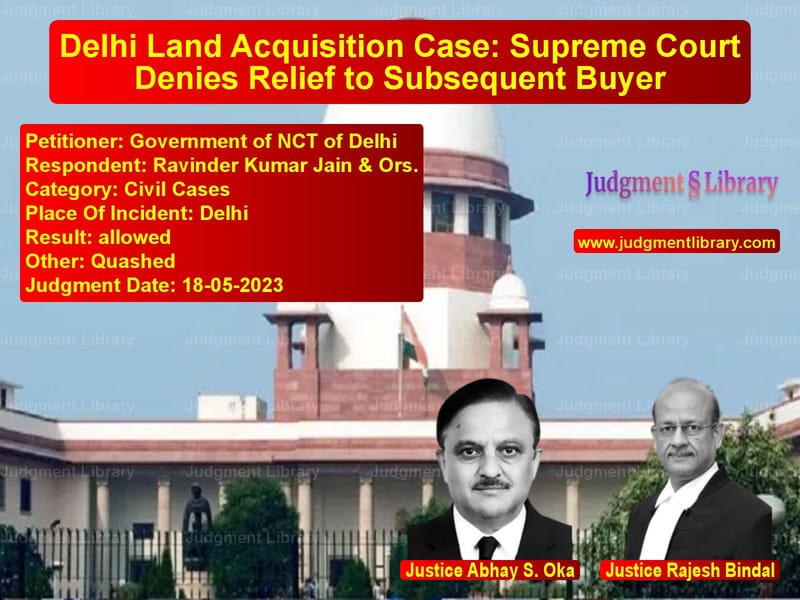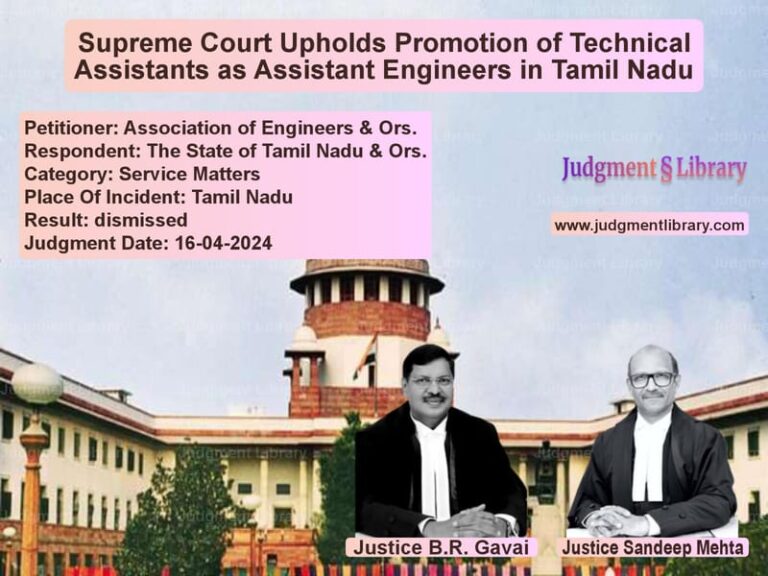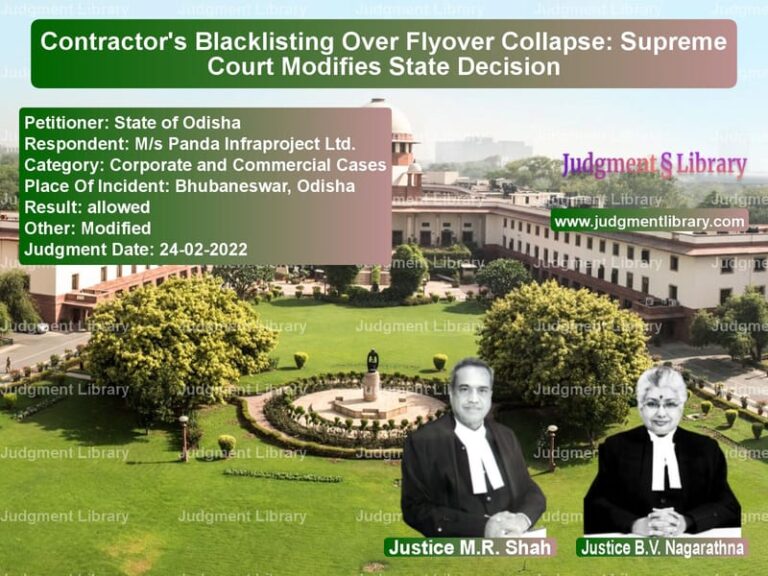Delhi Land Acquisition Case: Supreme Court Denies Relief to Subsequent Buyer
The Supreme Court of India recently delivered a significant ruling in the case of Government of NCT of Delhi v. Ravinder Kumar Jain & Ors.. The case revolved around land acquisition and whether a subsequent buyer of acquired land had the right to challenge the acquisition under the Right to Fair Compensation and Transparency in Land Acquisition, Rehabilitation and Resettlement Act, 2013 (the 2013 Act). The Supreme Court set aside the Delhi High Court’s decision, ruling that the acquisition had not lapsed and the subsequent buyer had no locus to challenge it.
Background of the Case
The dispute involved a piece of land for which the acquisition process began with a notification under Section 4 of the Land Acquisition Act, 1894 (the 1894 Act) on November 25, 1980. A notification under Section 6 was issued on May 27, 1985, and an award under Section 11 was announced by the Land Acquisition Collector on June 5, 1987. The original owner challenged the acquisition by filing a writ petition in 1986, which was later dismissed for non-prosecution in 2004.
Meanwhile, respondent Ravinder Kumar Jain purchased the land via a registered sale deed dated June 18, 2003. He later filed a writ petition in the Delhi High Court under Section 24(2) of the 2013 Act, arguing that the acquisition had lapsed because neither possession had been taken nor compensation had been paid. The Delhi High Court ruled in his favor, prompting the Government of NCT of Delhi to appeal to the Supreme Court.
Arguments by the Appellant (Government of NCT of Delhi)
The Government of Delhi contended that:
- The original owner had already challenged the acquisition in 1986, and the petition was dismissed in 2004. The subsequent buyer had no locus standi to challenge the acquisition.
- As per the Supreme Court ruling in Shiv Kumar v. Union of India, a subsequent buyer of land after the notification under Section 4 of the 1894 Act does not have the right to invoke Section 24(2) of the 2013 Act.
- The land had already been acquired, and compensation had been determined. The 2013 Act did not provide any rights to those who purchased land after the acquisition process began.
Arguments by the Respondent (Ravinder Kumar Jain)
The respondent countered by stating:
- The land was never taken into possession, and no compensation was paid, making the acquisition void under the 2013 Act.
- He had legally purchased the land with permission under the Delhi Lands (Restrictions on Transfer) Act, 1972, and had constructed a house on it where he had been living for over a decade.
- Forcibly removing him would be unjust as he had been paying property tax and was legally residing on the land.
Supreme Court’s Observations and Judgment
The Supreme Court examined whether a subsequent buyer, after the land had been acquired, had the legal right to challenge the acquisition. The Court referred to the landmark ruling in Shiv Kumar v. Union of India, where it was held:
“A purchaser after Section 4 notification does not have the right to invoke Section 24(2) of the 2013 Act to claim that the acquisition has lapsed.”
The Court further emphasized that transactions executed after a Section 4 notification were considered void and did not grant the purchaser any rights. The judgment also cited Indore Development Authority v. Manoharlal, where the Constitution Bench had reiterated:
“The beneficiaries under Section 24(2) are those recorded as owners at the time of issuance of the notification under Section 4 of the 1894 Act. Purchasers after this notification have no right to challenge the acquisition.”
Additionally, the Court rejected the respondent’s claim that his residence on the land gave him a right to challenge the acquisition, stating:
“Subsequent purchasers cannot claim rehabilitation and resettlement as per the 2013 Act, as their land was already acquired. The 2013 Act aims to benefit original landowners, not those who purchase land knowing it was already acquired.”
Final Verdict
The Supreme Court allowed the appeal, setting aside the Delhi High Court’s ruling. It held:
- The land acquisition had not lapsed under the 2013 Act.
- A subsequent buyer had no locus to challenge the acquisition.
- The purchase made by the respondent was void as per law, and he could not claim any rights over the acquired land.
Key Takeaways from the Judgment
- A person who purchases land after a notification under Section 4 of the 1894 Act does not have the right to challenge the acquisition under Section 24(2) of the 2013 Act.
- Subsequent buyers cannot claim higher compensation, rehabilitation, or resettlement benefits under the 2013 Act.
- The Supreme Court reaffirmed that land acquisition proceedings do not lapse simply because possession was not taken or compensation was not paid to a subsequent buyer.
- Transactions made after a Section 4 notification are void and confer no legal rights upon the purchaser.
Conclusion
The Supreme Court’s ruling reinforces the principle that land acquisition laws are meant to protect the rights of original landowners, not speculative buyers who purchase land after acquisition proceedings have begun. This judgment serves as a critical precedent for future cases involving land acquisitions and subsequent buyers attempting to challenge them.
Petitioner Name: Government of NCT of Delhi.Respondent Name: Ravinder Kumar Jain & Ors..Judgment By: Justice Abhay S. Oka, Justice Rajesh Bindal.Place Of Incident: Delhi.Judgment Date: 18-05-2023.
Don’t miss out on the full details! Download the complete judgment in PDF format below and gain valuable insights instantly!
Download Judgment: government-of-nct-of-vs-ravinder-kumar-jain-supreme-court-of-india-judgment-dated-18-05-2023.pdf
Directly Download Judgment: Directly download this Judgment
See all petitions in Property Disputes
See all petitions in Landlord-Tenant Disputes
See all petitions in Judgment by Abhay S. Oka
See all petitions in Judgment by Rajesh Bindal
See all petitions in allowed
See all petitions in Quashed
See all petitions in supreme court of India judgments May 2023
See all petitions in 2023 judgments
See all posts in Civil Cases Category
See all allowed petitions in Civil Cases Category
See all Dismissed petitions in Civil Cases Category
See all partially allowed petitions in Civil Cases Category







